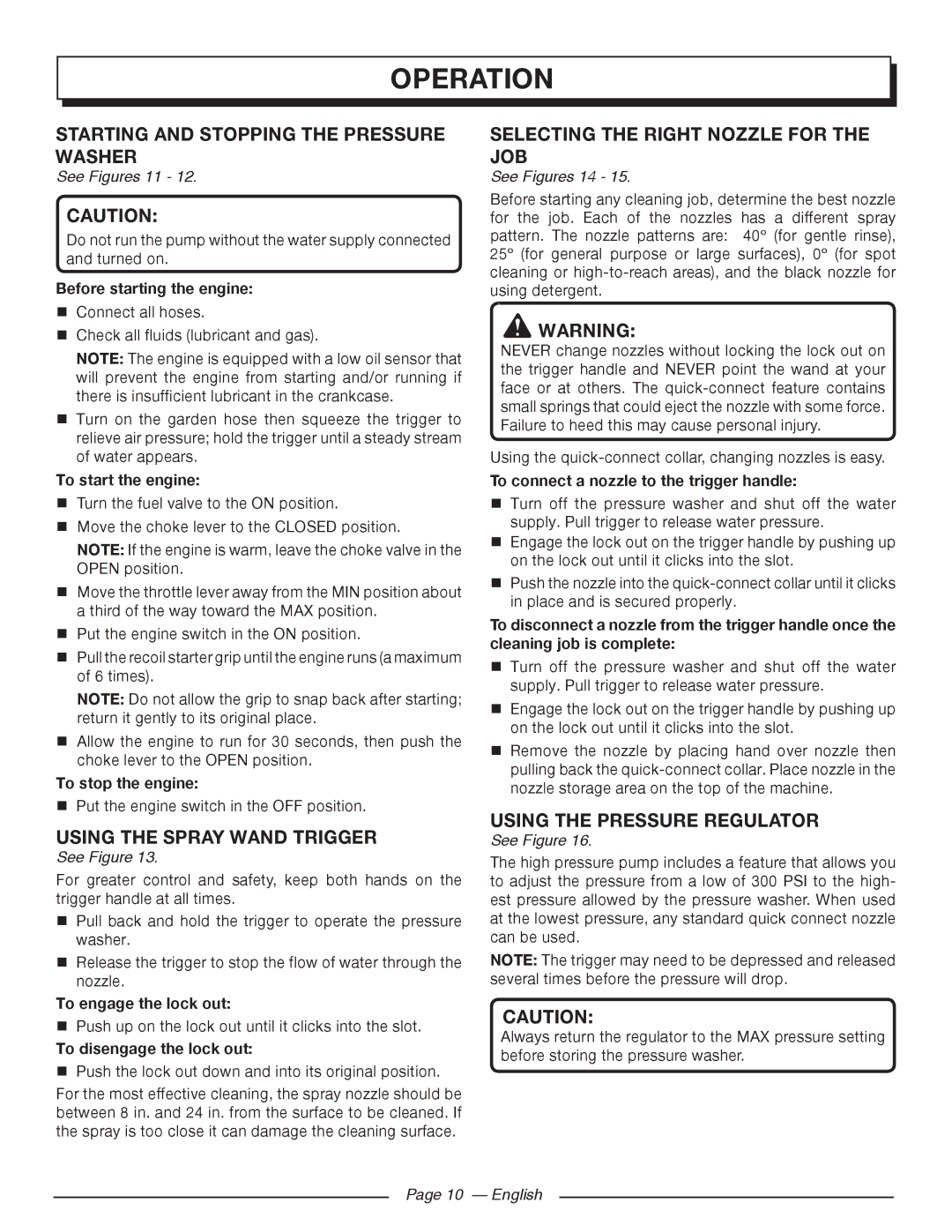
operation
starting and stopping the pressure washer
See Figures 11 - 12.
caution:
Do not run the pump without the water supply connected and turned on.
Before starting the engine:
Connect all hoses.
Check all fluids (lubricant and gas).
NOTE: The engine is equipped with a low oil sensor that will prevent the engine from starting and/or running if there is insufficient lubricant in the crankcase.
Turn on the garden hose then squeeze the trigger to relieve air pressure; hold the trigger until a steady stream of water appears.
To start the engine:
nTurn the fuel valve to the ON position.
nMove the choke lever to the closed position.
NOTE: If the engine is warm, leave the choke valve in the OPEN position.
nMove the throttle lever away from the MIN position about a third of the way toward the MAX position.
nPut the engine switch in the ON position.
nPull the recoil starter grip until the engine runs (a maximum of 6 times).
NOTE: Do not allow the grip to snap back after starting; return it gently to its original place.
nAllow the engine to run for 30 seconds, then push the choke lever to the open position.
To stop the engine:
Put the engine switch in the OFF position.
using the spray wand trigger
See Figure 13.
For greater control and safety, keep both hands on the trigger handle at all times.
nPull back and hold the trigger to operate the pressure washer.
nRelease the trigger to stop the flow of water through the nozzle.
To engage the lock out:
nPush up on the lock out until it clicks into the slot.
To disengage the lock out:
nPush the lock out down and into its original position.
For the most effective cleaning, the spray nozzle should be between 8 in. and 24 in. from the surface to be cleaned. If the spray is too close it can damage the cleaning surface.
SELECTing the RIGHT NOZZLE FOR THE JOB
See Figures 14 - 15.
Before starting any cleaning job, determine the best nozzle for the job. Each of the nozzles has a different spray pattern. The nozzle patterns are: 40º (for gentle rinse), 25º (for general purpose or large surfaces), 0º (for spot cleaning or
![]() WARNING:
WARNING:
NEVER change nozzles without locking the lock out on the trigger handle and never point the wand at your face or at others. The
Using the
To connect a nozzle to the trigger handle:
nTurn off the pressure washer and shut off the water supply. Pull trigger to release water pressure.
nEngage the lock out on the trigger handle by pushing up on the lock out until it clicks into the slot.
nPush the nozzle into the
To disconnect a nozzle from the trigger handle once the cleaning job is complete:
nTurn off the pressure washer and shut off the water supply. Pull trigger to release water pressure.
nEngage the lock out on the trigger handle by pushing up on the lock out until it clicks into the slot.
nRemove the nozzle by placing hand over nozzle then pulling back the
using the pressure regulator
See Figure 16.
The high pressure pump includes a feature that allows you to adjust the pressure from a low of 300 PSI to the high- est pressure allowed by the pressure washer. When used at the lowest pressure, any standard quick connect nozzle can be used.
NOTE: The trigger may need to be depressed and released several times before the pressure will drop.
CAUTION:
Always return the regulator to the MAX pressure setting before storing the pressure washer.
Page 10 — English
